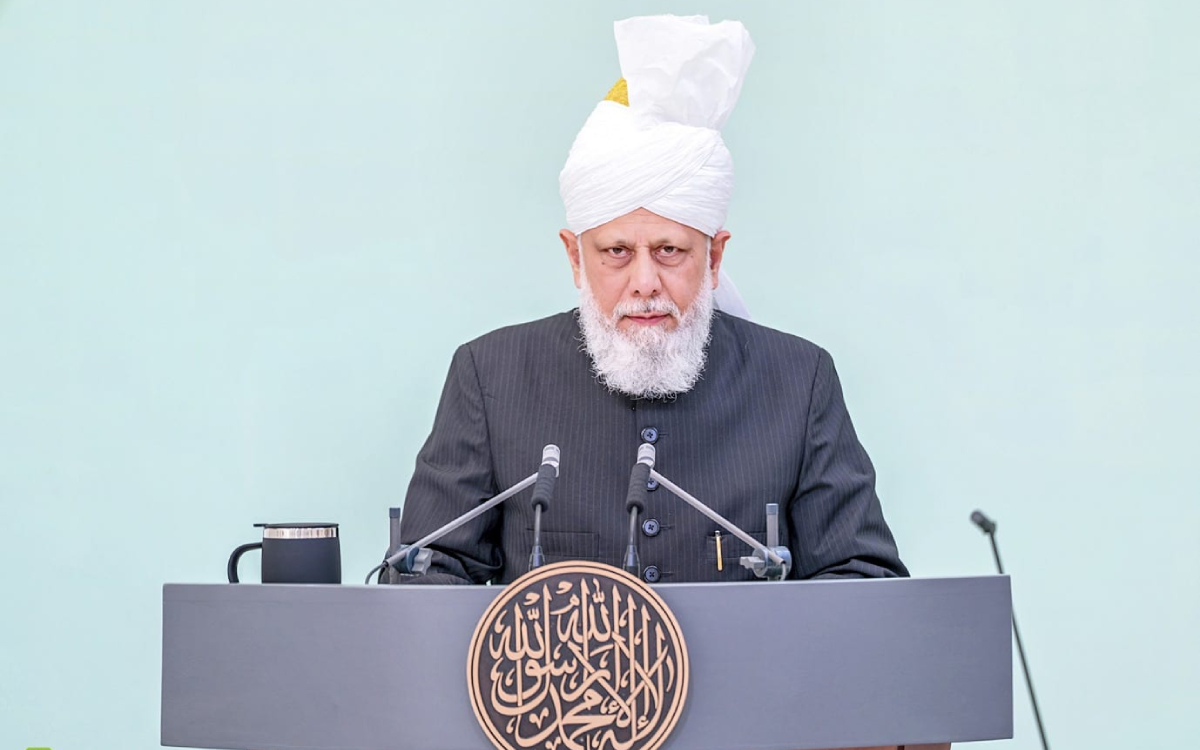Friday Sermon delivered by
Hazrat Mirza Masroor Ahmad(at)
Friday Sermon delivered at Masjid Mubarak, Islamabad, Tilford, UK
Rightly Guided Caliphs – Hazrat Umar(ra)
After reciting Tashahhud, Ta‘awwuz and Surah al-Fatihah, His Holiness, Hazrat Mirza Masroor Ahmad(aba) said that he would continue highlighting incidents from the life of Hazrat Umar(ra).
The Battle of Yarmuk
His Holiness(aba) said that he would detail incidents regarding the Battle of Yarmuk. His Holiness(aba) said that there are some varying opinions as to when exactly this battle took place, but according to historical accounts, it is clear that it took place during the Caliphate of Hazrat Umar(ra). The Romans had been suffering defeat upon defeat at the hands of Muslims, due to which they called upon their allies and those under their rule to establish a large army. Hazrat Abu Ubaidah(ra) learned of these plots and ploys and encouraged the Muslims. It was suggested that the Muslims would form their ranks outside of the city and those envious which had already embarked should be called back in order to help the Muslims army. Up until then, the Muslims had made a pact with the Christian tribes and allowed them to maintain their lands and properties. Hazrat Abu Ubaidah(ra) decided that all the tax which used to be collected from them was returned to each individual. Upon hearing this, the Christian people rejoiced. In fact, not only did Hazrat Abu Ubaidah(ra) do this with the residents of Homs, but said that the same should be done for all those places which had been conquered. After this, Hazrat Ubaidah(ra) travelled from Homs to Damascus where he would inform Hazrat Umar(ra) about what had happened and seek counsel from other army leaders.
His Holiness(aba) said that Hazrat Abu Ubaidah(ra) went to Yarmuk, located close to the river of Jordan. The Romans had a large army, which was causing fear in the hearts of some Muslims. When Hazrat Umar(ra) was informed of this, he spoke to the Muhajireen and Ansar who all expressed their desire to help. In the end, it was decided that more troops would be sent in order to help replace those already there. At the same time, more armies and envoys were sent in order to join the Muslims. The Roman army totalled around 200,000 and had their religious leaders at the forefront of their ranks. As the two armies came face to face, the religious leaders advanced, and the Muslims came forward as well, and thus beginning the battle. Later on during the battle, the Muslims were proving to be victorious. As the day came to an end, the battle was paused until the next day. During the night, the Romans plotted to offer the Muslims wealth in order to avoid any further fighting. A Roman by the name of George approached the Muslims the next day and asked them to appoint a representative to negotiate terms of a peace treaty. Hazrat Abu Ubaidah(ra) appointed Hazrat Khalid(ra) for this task.
His Holiness(aba) said that in the meantime, one of the Christians saw Hazrat Abu Ubaidah(ra) praying in the mosque. Afterwards, he asked him what Islam has to say about Jesus(as). Hazrat Abu Ubaidah(ra) replied by reciting verses of the Holy Qur’an regarding Jesus(as) which greatly impressed the Christian man. He agreed as a result that the Holy Prophet(sa) was truthful and accepted Islam. He did not wish to return to his people, however, Hazrat Abu Ubaidah(ra) said that if he did not return, the Romans may think this to be a gesture of non-compliance. Thus, he told him that he should go back the next day with the representative appointed for the Muslims.
His Holiness(aba) said that the next day, the Romans attempted to entice the Muslim representative with riches and wealth and cited their good treatment of the Arabs in the past. Then they offered monetary compensation for the Muslims leaving the battle. The Muslim representative realised that these conditions were being presented only because the Romans were realising their imminent defeat. He replied by saying that the Romans had only treated the Arabs well in order to spread their religion to them, and those same Arabs were fighting against them alongside the Muslims. Furthermore, he said that though the Romans may be wealthy, the Muslims were given the greatest wealth by the Holy Prophet(sa). Thus, he stipulated the condition that if the Romans agreed to pay jizya [tax] then the battle could cease and the Romans would be spared. However they strongly refused the idea of paying any sort of tax, and thus, preparations for another battle ensued. The Muslims fought valiantly and were encouraging one another during the battle. Although the Muslim army was not more than 30,000-35,000, including women who fought courageously, the Romans were defeated. His Holiness(aba) further detailed some incidents of bravery and courage displayed by the Muslims during the battle.
Valour of the Muslims During the Battle
His Holiness(aba) said that there are varying accounts of how many Romans were killed, ranging from 70,000 to 100,000, whereas 3,000 Muslims were martyred during the battle. Hazrat Umar(ra) had anxiously been waiting to hear about the outcome of this battle and had not slept. Upon hearing that the Muslims were victorious, he immediately fell into prostration, thanking God. Hazrat Umar(ra) also instructed that the tax had been instituted in areas which had been conquered by the Muslims on the condition that the Muslims would protect them. However, since the Muslim army had been fighting another battle and were unable to be present in those areas, the amount received in tax from them was to be returned. Such an example has never been established by any other ruler in history.
His Holiness(aba) related an incident from this battle regarding Ikrimah. After the battle, he and others who had been fighting were found after the battle to be severely injured. Ikrimah was presented with water, but he indicated that the person beside him should be given water first. When water was presented to that person, he indicated that the person beside him should be given water first. This continued, until the last person was presented with water, but he passed away, and during this time, all of the others had also passed away.
His Holiness(aba) said that he would continue highlighting incidents from the life of Hazrat Umar(ra) in future sermons.
Summary prepared by The Review of Religions

